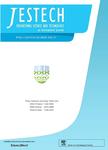版权所有:内蒙古大学图书馆 技术提供:维普资讯• 智图
内蒙古自治区呼和浩特市赛罕区大学西街235号 邮编: 010021

作者机构:Dokuz Eylul Univ Fac Engn Dept Ind Engn TR-35397 Izmir Turkey Izmir Bakircay Univ Dept Ind Engn TR-35665 Izmir Turkey
出 版 物:《ENGINEERING SCIENCE AND TECHNOLOGY-AN INTERNATIONAL JOURNAL-JESTECH》 (Eng. Sci. Technol. Int. J.)
年 卷 期:2022年第35卷
核心收录:
学科分类:12[管理学] 1201[管理学-管理科学与工程(可授管理学、工学学位)] 08[工学]
主 题:Artificial neural networks Machine learning Hyper -heuristics Particle swarm optimization Flower pollination algorithm Differential evolution algorithm
摘 要:Artificial Neural Networks (ANNs) offer unique opportunities in numerous research fields. Due to their remarkable generalization capabilities, they have grabbed attention in solving challenging problems such as classification, function approximation, pattern recognition and image processing that can be quite complex to model mathematically in practice. One of the most vital issues regarding the ANNs is the training process. The aim at this stage is to find the optimum values of ANN parameters such as weights and biases, which indeed embed the whole information of the network. Traditional gradient-descent -based training methods include various algorithms, of which the backpropagation is one of the best-known. Such methods have been shown to exhibit outstanding results, however, they are known have two major theoretical and computational limitations, which are slow convergence speed and possible local minima issues. For this purpose, numerous stochastic search algorithms and heuristic methods have been individually used to train ANNs. However, methods, bringing diverse features of different optimiz-ers together are still lacking in the related literature. In this regard, this paper aims to develop a training algorithm operating based on a hyper-heuristic (HH) framework, which indeed resembles reinforcement learning-based machine learning algorithm. The proposed method is used to train Feed-forward Neural Networks, which are specific forms of ANNs. The proposed HH employs individual metaheuristic algo-rithms such as Particle Swarm Optimization (PSO), Differential Evolution (DE) Algorithm and Flower Pollination Algorithm (FPA) as low-level heuristics. Based on a feedback mechanism, the proposed HH learns throughout epochs and encourages or discourages the related metaheuristic. Thus, due its stochas-tic nature, HH attempts to avoid local minima, while utilizing promising regions in search space more conveniently by increasing the probability of invoking relatively more